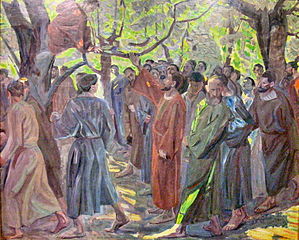Transforming: The Church as Agent of Change in the Story of Zacchaeus
The power of personal faith in Christ changing people and society around them. A study in Luke 19:1-10 by James D. Hernando.

Zacchaeus by Niels Larsen Stevns / Wikimedia Commons.
The story of Zacchaeus is one of the most intriguing in Luke’s gospel—a literary masterpiece filled with vivid imagery, drama, and biting irony. It is the story of the conversion of an arch villain in Jewish society who has a transforming encounter with the Lord. But it also offers marvelous insight into how the church transforms society one converted sinner at a time.
Enter the Villain
Luke quickly opens his story by introducing the main character in the briefest fashion. However, English readers seldom catch the innuendo of the Greek syntax. “There was a man called by name Zacchaeus.” Luke is undoubtedly calling attention to the man’s name, which is derived from the Hebrew root1 meaning “pure” or “acquitted one.” The irony leaps out from Luke’s pen with the ensuing words, “and he was a chief tax collector.” Tax collectors (Gk. telonai) were locals hired by cities and towns to collect taxes for the Romans. Zacchaeus was a “chief” tax collector (Gk. architelones), which meant he probably had supervision over a region and number of tax collectors. Luke’s words “and he was rich” would certainly not go unnoticed by Jews in Jesus’ day. The privilege of collecting taxes was offered at a steep price and those who held that job set tax rates that often exceeded by far any quotas demanded by Rome. While tax-collectors had no authority to confiscate funds or property, they held great leverage over the people as they could exact severe penalties by reporting tax delinquency to the Romans. This they often did whether the charge were true or not.2 And so here Luke presents an arch villain who is ironically named. He was anything but someone of pure or blameless character; he was, in fact, the exact opposite of his name. Keep in mind also that “tax-collectors” were notorious for their corruption and the mere mention of their profession aligned them with “sinners.” (See Matt. 9:11; Mark 2:15f; Luke 5:30).
The Action of Zacchaeus
Why did a notorious sinner want to see Jesus?
Category: Biblical Studies, Fall 2008


